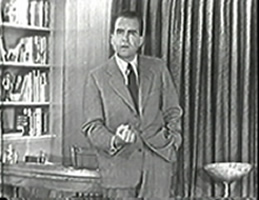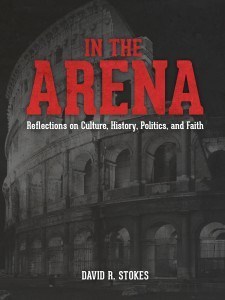David R. Stokes's Blog, page 2
September 28, 2016
The Day Politics Met Television
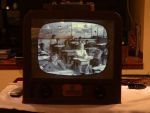 It was the dawn of the television age—the beginning of an entertainment, information, and communication seismic shift. In living rooms around the country, the large radio, complete with it’s prominently displayed dials, would be exiled to elsewhere in the house and the furniture would begin to arrange itself around the new media kid in town…[read full post]
It was the dawn of the television age—the beginning of an entertainment, information, and communication seismic shift. In living rooms around the country, the large radio, complete with it’s prominently displayed dials, would be exiled to elsewhere in the house and the furniture would begin to arrange itself around the new media kid in town…[read full post]


The Day Politics Met Television
One day in 1974, as Spring began to give way to Summer, Frank Gannon—wordsmith and White House Fellow—took a walk in Washington, largely to get away from the stress induced by the Nixon White House’s ever-increasing Watergate milieu. He found his way to an old theater—one that happened to be featuring a triple billing of anti-Nixon films. He felt uncomfortable—even somewhat guilty—for being there, but for whatever reason even this was a welcome break from what was happening a few blocks away. He looked around and, though the lights were out, sensed the crowd’s unmistakable derision every time Richard Nixon’s familiar image appeared on the screen.
Then something curious happened.
The final feature of the odd cinematic trilogy was the simple replaying of a speech Mr. Nixon had given more than two decades earlier—on September 23, 1952—at another embattled moment in his career. The grainy video was designed to be the program’s pièce de résistance. But as a much younger Richard Nixon delivered his remarks on the screen that day, it was the audience that Gannon noticed. For whatever reason, the sarcastic hisses had stopped as Nixon spoke of finances and family and a dog named Checkers. It was almost as if these decidedly anti-Nixon partisans were suddenly fascinated.
He was 39-years old and on the verge of national leadership—the junior United States Senator from California and the Republican nominee for Vice President. He was living the American dream and fulfilling many of his own. And along the way, he carried the hopes of a new generation of Americans, those who had emerged from the darkness of global conflict with renewed resolve to embrace life and ensure that such a catastrophe never happened again.
In fact, this rising political star whose magnitude had increased so dramatically in six short years, had already experienced the clash of personalities and ideologies that was to define his generation. Richard Milhous Nixon would be a transcendent political figure in America for quite some time. His name would appear on five national ballots—a feat equaled only by Franklin Delano Roosevelt—two times for Vice-President and three for President. And like FDR, he would lose only once, and that barely to another young politician, this one from Massachusetts, who was making his own history in 1952.
Mr. Nixon is most often remembered through the prism of how his career—at least the public part—ended in August of 1974. This is not only unfortunate, but it also prevents us from figuring out how this man who fathomed such deep valleys managed to actually scale the highest political mountains extant. How could Nixon have done all he did if the caricature of him in the minds of so many Americans was an accurate characterization?
Understanding what he did in 1952 is crucial to processing all the rest. What is lost to so many in the fog of all that later transpired, is that Richard Nixon was actually right on the facts, as well as the politics, in 1952. He did not wiggle out of a mess. In fact, he demonstrated a clear capacity for communication and connection with the American people.
It was the dawn of the television age—the beginning of an entertainment, information, and communication seismic shift. In living rooms around the country, the large radio, complete with it’s prominently displayed dials, would be exiled to elsewhere in the house and the furniture would begin to arrange itself around the new media kid in town. The device that Edward R. Murrow would later characterize as “lights and wires in a box,” would eventually become so essential to Americans that they wondered how they ever lived without it. Although, until that September night when Richard Nixon spoke “coast to coast,” the shift from wireless to tube was anything but a done deal. And as the young politico prepared to make his case to the American people, he had no way of knowing that not only what he had to say would be important, but where he said it would be, as well—even more so.
It was the first synchronization of medium and message for a new age. This was the moment when television began to trump radio—even motion pictures—as the entertainment choice du jour of Americans. We loved Lucy, watched “Uncle Miltie,” and got our information more and more as much from Edward R. Murrow as from the venerable morning and evening newspapers.
In fact, in many ways it was the Checkers speech that signaled the beginning of our ever since fascination with the glowing tube. More Americans watched Nixon that September night than would watch any single event on T.V. for many years to come. But even politicians were slow to figure out what it all meant. The Republican National Committee put their Vice Presidential candidate on two radio networks (Mutual and Columbia; MBS, CBS), while on only one television hook-up (NBC). But, no matter—suspense built, and by airtime at 9:30 p.m. (eastern) on Tuesday, September 23, 1952 nearly 60 million viewers tuned in—an unheard of audience up to that point and well beyond.
Forget what else was airing or happening, or that Jersey Joe Walcott was defending his World’s Heavyweight Boxing Championship that very night and hour against a guy named Rocky Marciano—the fight had been blacked out on radio and television anyway and could only be seen live in Philadelphia or via a primitively skeletal network of closed circuit venues (complete with its famous knockout punch)—people wanted to hear what this man accused of financial improprieties would have to say. Would he resign from the Republican ticket? Would he tell the truth? Would he really give out his personal financial details when no other politician at the time did?
What viewers saw that night was a presentation—primitive in its production quality, in keeping with the technology of the young medium—carefully crafted and skillfully delivered. It was a deliberately arranged combination of facts, figures, family, and country. At moments it was clinical. Occasionally it was corny. But it all worked.
The great General of World War II and D-Day, Dwight D. Eisenhower, the Republican candidate for President and the man who held Nixon’s fate in his recently-indecisive hands, made notes as he watched his young running mate on television. And at one point, something Nixon said so disturbed him that he broke his pencil on his pad of paper.
Mrs. Eisenhower wept as she watched.
Mrs. Nixon sat near her husband at the otherwise empty El Capitan Theater in Hollywood. Some reporters saw his wife’s presence cynically, but they soon forgot about it as Mr. Nixon told a story that would chisel this small screen moment in storied stone. It was about a cocker spaniel: Yep—a dog. A dog named Checkers.
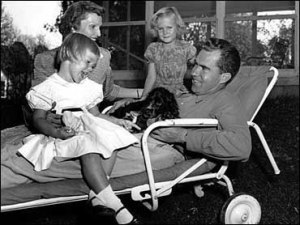 The broadcast was missed by many and dismissed by many more. The Democratic nominee for President that year, Adlai Stevenson—a man who prided himself on his use of the spoken word—didn’t even bother watching. He was convinced that television was a passing fad for plebeians. And even after watching the speech, Mr. Eisenhower still did not know what to make of, or do, with Nixon. It was powerful political drama, but more than that—it was great cultural drama.
The broadcast was missed by many and dismissed by many more. The Democratic nominee for President that year, Adlai Stevenson—a man who prided himself on his use of the spoken word—didn’t even bother watching. He was convinced that television was a passing fad for plebeians. And even after watching the speech, Mr. Eisenhower still did not know what to make of, or do, with Nixon. It was powerful political drama, but more than that—it was great cultural drama.
Nixon didn’t read a script or use a teleprompter, but rather he used a few notes to aid his prodigious memory, as would be his style throughout most of his public career. He demonstrated a mastery of detail and appeared to Americans as a sort of new kind of political communicator—just a guy having an animated conversation with friends. When the half-hour was up, the camera lights turned off before the candidate could actually give out the contact information for phone calls and telegrams to the Republican National Committee. Mad at himself for such an inexactitude, he was certain that he had failed—until he noticed one of the cameramen crying.
A few minutes later Darryl Zanuck, the Hollywood mogul whose career included the production of the first “talking” movie (The Jazz Singer in 1927) and hits such as All About Eve (1950), phoned. He told Richard Nixon that the broadcast was “the most tremendous performance” he’d ever seen. This from a man known for the saying: “There is nothing duller on the screen than being accurate but not dramatic.”
Calls and telegrams overwhelmed the RNC. It was quickly obvious that Nixon had not only won the day, but that he had tapped into something powerful. He had gone directly to the people in a way not really done before. Americans had read and heard speeches for generations, but this was something different—they saw and, for a brief and shining moment, they connected. And what too many casual observers miss is that Richard Nixon not only survived his first firestorm, he triumphed that night in 1952.
[This article was originally written for the Nixon Foundation — DRS]
The post The Day Politics Met Television appeared first on David R. Stokes.
Can a Bad Cold Stop a Dog’s Bark?
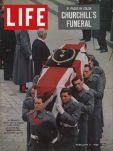
The historian part of my brain is increasingly intrigued by moments in time when a dog did not bark. Of course, this is reference to a famous Sherlock Holmes story called, “Silver Blaze,” and how the fictional detective made a deduction based on the fact that a dog that should have barked at a stranger, did not. This told Holmes that the culprit was someone familiar to the dog.
So as a writer, I’ve wondered why certain people didn’t do the obvious thing. From there, my imagination takes charge. The book I’m currently working on—“The Churchill Plot”—is a great case in point. [READ MORE]


September 12, 2016
Nothing New About Presidential Candidates Who Hide Health Issues
In light of the current discussion about health and presidential candidates, I’m reminded about something I wrote related to this a while back. In my book, JACK & DICK: When Kennedy Met Nixon, I described a scene on a train in 1947, when Richard Nixon saw something that prompted a question about Kennedy’s health. In the author’s note at the end of the “based on a true story” novel (read: the story really happened by I have invented some of the dialogue), I gave a little background.
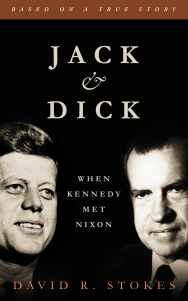 Late in the story, I mention something about a wound on Jack Kennedy’s thigh that prompted the question from Richard Nixon. Kennedy dismissed it and changed the subject. In truth, what I have Nixon noticing in my fictional account is based on fact. Kennedy suffered from Addison’s Disease, a chronic and serious endocrine disorder. He was treating it with DOCA (desoxycorticosterane), as I mention in the story. The aforementioned novel by Francine Mathews deals with this issue, as well.
Late in the story, I mention something about a wound on Jack Kennedy’s thigh that prompted the question from Richard Nixon. Kennedy dismissed it and changed the subject. In truth, what I have Nixon noticing in my fictional account is based on fact. Kennedy suffered from Addison’s Disease, a chronic and serious endocrine disorder. He was treating it with DOCA (desoxycorticosterane), as I mention in the story. The aforementioned novel by Francine Mathews deals with this issue, as well.
None of this was publicly known during Jack’s lifetime. In fact, the Kennedy campaign in 1960 flatly denied that he had Addison’s Disease, a serious condition that would presumably have been of interest to voters. Lyndon Johnson had tried to make an issue of it in the build up to the Democratic Convention in Los Angeles that year, but the firm denials from the Kennedy camp won the day.
Johnson, though, knew he was right, and this might have been on his mind when he decided to join Kennedy on the ticket. Clare Booth Luce asked LBJ around that time why he had accepted the nomination for such an ineffectual office as Vice President, when he had been the powerful Senate Majority Leader. He replied: “Clare, I looked it up: one out of every four Presidents has died in office. I’m a gamblin’ man, darlin,’ and this is the only chance I got.”
In the emergency room at Parkland Hospital on November 22, 1963, Kennedy’s physician, Dr. George Burkley, asked the ER doctors to give Kennedy hydrocortisone because the President had Addison’s Disease. Likely one of the reasons the Secret Service and the Kennedy family resisted the performance of an autopsy in Dallas was because of past denials of what was finally acknowledged fact.
Nixon likely knew about Kennedy’s health challenges, as well, during the 1960 campaign. But he refrained from bringing the issue up, even though it might have been used to counter Jack’s charismatic image on the campaign trail and on television. That, and the fact that he didn’t challenge the election results in spite of strong evidence of fraud, are two often overlooked examples of Nixon’s capacity for restraint and mercy, his later actions notwithstanding.
[ABOUT THE BOOK: John F. Kennedy and Richard M. Nixon met for the first time in early 1947, when they became part of the 80th Congress. A few months later—and thirteen years before their historic competition for the presidency—they traveled to McKeesport, Pennsylvania, where they debated the merits of a new labor law.
But their minds were on bigger things.
As fate would have it, Jack and Dick shared a Pullman compartment on a train for the overnight trip back to Washington. They stayed awake all night talking about their lives, hopes, and visions for a better world. This book is based on a very true story.
Bestselling author David R. Stokes imagines how the conversation might have unfolded that long-ago night. Based on extensive research, and complete with a lengthy and unusual-for-a-novel bibliography, “JACK & DICK: When Kennedy Met Nixon” gives readers the chance to eavesdrop as two ambitious men have an animated conversation about history, world leaders, and the brewing geopolitical issues they would face one day as leaders of the free world.
It was the dawn of the Cold War, and these two former Naval officers were developing a vision for the world, one that would be “tempered by a hard and bitter peace.” And years later, the political torch would be passed to Jack Kennedy and Dick Nixon, who represented “a new generation of Americans.”]


August 29, 2016
Can a Bad Cold Stop a Dog’s Bark?
The historian part of my brain is increasingly intrigued by moments in time when a dog did not bark. Of course, this is reference to a famous Sherlock Holmes story called, “Silver Blaze,” and how the fictional detective made a deduction based on the fact that a dog that should have barked at a stranger, did not. This told Holmes that the culprit was someone familiar to the dog.
So as a writer, I’ve wondered why certain people didn’t do the obvious thing. From there, my imagination takes charge. The book I’m currently working on—“The Churchill Plot”—is a great case in point.
I begin with a question:
Why would President Lyndon Johnson, a consummate politician who had just been inaugurated in 1965 for his own term following a landslide election victory the previous November, choose to stay home from the funeral of the century—the grand farewell to Winston Churchill—on the flimsy pretext of a “bad cold,” instead of seizing the opportunity to appear as the dominant political leader on the world stage?
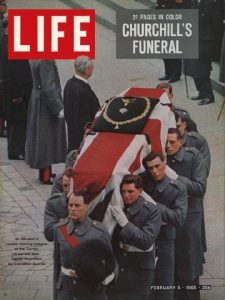
Why would Mr. Johnson even refuse to send his new vice president, Hubert Humphrey, to Churchill’s funeral?
And, why would the secretaries of the defense and state departments eventually travel to London as part of the “official” US delegation, only to be conspicuously absent from the actual funeral service in historic St. Paul’s Church?
Why indeed.
With these verifiable facts as a starting point, I then invite readers through the looking glass and into a murky fictional world of shadows, mystery, and intrigue.
As 90 year-old Winston Churchill barely clings to life in January 1965, Great Britain and the world prepare for the funeral of the century. The long-planned grand farewell (Codenamed: Operation Hope Not) will be attended by an unprecedented array of world leaders, all vying for the attention of the 350 million people who will watch it all via new satellite technology.
America and the world had not yet fully recovered from the assassination of Johnson’s presidential predecessor, John F. Kennedy, fourteen months earlier. Yet, in a way that possibly connects back to that horrific moment in Dallas, there are rumors of yet another plot. This one involves a possible deadly terrorist attack during Winston Churchill’s funeral, at the moment when more than 100 world leaders will be together in one confined place.
President Johnson learns about this and discreetly reaches out to some of his contacts in the intelligence world, including one of the men he put on the Warren Commission—the “official” investigation into JFK’s murder.
These men—some whose names will eventually become familiar notorious in American politics—have one mission: to prevent a catastrophe that could change the course of human history.
Along the way, the American operatives uncover a conspiracy more far-reaching than they could have ever imagined.
The project is coming along. I’m currently revising a few sections based on feedback from my editor. So as we say in radio—stay tuned. I’ll keep you posted.
The post Can a Bad Cold Stop a Dog’s Bark? appeared first on David R. Stokes.
July 4, 2016
PILGRIM PATRIOTISM
[This is an unedited transcript of an extemporaneous talk I shared on July 4, 2010, as our nation celebrated its 234th birthday — DRS]
Well happy birthday, America! A lot of people want to come here. I don’t see many people wanting to leave; it’s a bastion of freedom and hope. We’re sometimes misunderstood around the world. But that’s okay. We know who we are, what we stand for, and we should never forget.
I want to talk to you today about something I’m going to call…Pilgrim Patriotism. I’m going to touch on the requisite patriotic stuff because I think that’s important. I do believe there is a God-and-country dynamic we certainly need. But I want to frame it not only with the term pilgrim as it applies to that band of people who came over on the Mayflower in 1620, but as it applies to all of us.

If you really want to understand what it means to be patriotic and if you want to do your country the best service possible: Don’t just be a patriot; be a pilgrim patriot.
Now I want to read several passages today. The first is in Matthew chapter 22, during the last week of Jesus’ life. He will go to Calvary in a few days and many are still trying to cross him up so they can undermine his ministry.
So it says in verse 15 of Matthew 22, “Then the Pharisees went out and laid plans to trap Him in His words.” They were always doing this. They were the guardians of the law and saw themselves as way too self-important. “They sent their disciples to Him along with the Herodians.” Now this is a more obscure group, we don’t have a lot of clues about this group in history extant. But there is clue in the name, Herodian. This, of course, is related to Herod.
Herod was the secular ruler, the Herods and so forth, and the Herodians were Jewish people who were unusually loyal to Rome. They represent for us, I think, the state, civil authority, and people who might place too much hope, homage, and bias toward the state.
So you have the religionists and secularists trying to trap Jesus.
Teacher,’ they said, ‘we know you are a man of integrity and that You teach the way of God in accordance with the truth. You aren’t swayed by men, because You pay no attention to who they are. Tell us then, what is Your opinion? Is it right to pay taxes to Caesar or not?
Now this is a really interesting query—a classic trick question. Have you seen those commercials for GEICO? You know, the ones that start: “Can you save money by calling GEICO?” Well the latest one that’s out, it’s just out this weekend, has me laughing my head off. It asks, “Did Abraham Lincoln really tell the truth?” And it shows this old honest Abe standing behind his wife, as she looks into a mirror, asking her husband if her dress makes her look big? Lincoln stands behind her and after a few moments of tortured silence, says, “Perhaps…”—and Mary Todd Lincoln storms out.
It was a trick question.
Well, they were trying to trap Jesus and it was a very tricky question. Here’s their question: Do you pay taxes to Caesar?
Why would that be a trick? Well, because the Jews were an occupied people. They didn’t like Rome. The very idea of paying tribute or tax to an occupying power was anathema to them. The Publicans were tax collectors, and they worked on commission. They went around harassing, even extorting, to collect taxes from of their kinsmen for the Roman authorities. So they were despised. Matthew was a converted publican—so was Zacchaeus. But taxes were very much a touchy subject because they were high—even exorbitant—and people didn’t always agree with how the money was used.
Sound familiar?
Taxes have always been a sensitive issue. They were 234 years ago when this country was born. And they’re a monumental issue again in our day and age.
So how is Jesus going to handle this? If he sounds too secular on them, he’ll lose the affection of most Jewish people. But if he doesn’t support the Caesar, he’ll be seen as a subversive. They think they’ve got Jesus painted into a corner.
Jesus responds masterfully (of course, He does!):
Show Me the coin used for paying the tax.’ They brought Him a denarius, and He asked them, ‘Whose portrait is this? And whose inscription?’ ‘Caesar’s,’ they replied.
He asked for a coin. A denarius was the equivalent, we’re told, of about a day’s wages back then. So just think of how much money, if you broke your salary down into a day, a workday, how much that would be?
On one side of the coin, it had an image of Caesar. This would have been Tiberius, and the other side had some writing including the term, “Pontifex Maximus,” which meant ruler, but also high priest. By the way, that designation survives today in Roman Catholicism and is attributed to the pope. Pontifex Maximus…
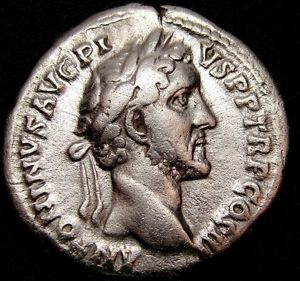
“Bring Me the coin,” Jesus said, and they weren’t expecting it. They’re dumbfounded.
‘Give to Caesar what is Caesar’s, and to God what is God’s.’ When they heard this, they were amazed. So they left him and went away.” I like the way it’s rendered in the more classic King James. He said to them, “‘Render therefore to Caesar the things that are Caesar’s, and to God the things that are God’s.’
That’s the balance. Patriotism, God, and country…the same as now.
Now there are some things we need to know about this. Number one—it is sort of a play on words—because if you realize the sovereignty of God, then everything belongs to God. So you’re really rendering everything to God, but if something belongs to Caesar, He says, “Render it,” as well. This is, of course, the tribute or the tax.
I think one of the points being made is that we are in a better position to truly render unto Caesar, unto the state, unto society, unto the culture, unto the government, and unto the country that which duly and truly belongs to it when we have first determined to render all things unto God.
That’s why I want to talk about pilgrim patriotism. Last week, I talked about the importance of the tent. If you were here last week, I talked about the patriarchs, and their journey and the importance of a tent as part of their spiritual journey. It’s also to be part of your spiritual journey.
The tent was a metaphor, I told you, for mobility, for moving on. We think of the pilgrims who left September 6, 1620 from England, and came to these shores, and saw the land for the first time.
They were called pilgrims originally by William Bradford, writing in Of Plymouth Plantation. He wrote that the word had significant meaning to them. To many Americans, to most Americans, it means the people who had Thanksgiving dinner with the Indians and had the funny hats. But, in fact, they were pilgrims because first they had been in Britain, but because there was a no separation of church and state there, and they had a state church. So the Church of England banned all “Separatists” and wanted to drive them out of the country. Some were killed, and many of them fled to Holland.

From there, they decided to go to the New World, coming over, famously, on the Mayflower. You know the story, and the Mayflower Compact and all that. What was unique about these people? They moved around a lot.
They were pilgrims. They drew that word from the Bible, from the book of Hebrews and I Peter. They were pilgrims. They were movable. This world was not really their home.
Bradford wrote in that book, “They knew they were pilgrims.” That’s where it comes from. That’s why we use that word to describe them. It says in Hebrews 11:
By faith Abraham, when called to go to a place he would later receive as his inheritance, obeyed and went, even though he did not know where he was going. By faith he made his home in the Promised Land like a stranger in a foreign country; he lived in tents, as did Isaac and Jacob, who were heirs with him of the same promise. For he was looking forward to the city with foundations, whose architect and builder is God.
They were looking for something spiritual. They were looking for something that came from God and therefore, they moved around. They weren’t tied to their old life. They weren’t tied to the values of this world. They (the old Patriarchs, history’s original “Pilgrims”) had an interest in the “promised” land—and that’s talking about Canaan. It’s still the land that is a subject of great dispute today. They were patriots, as well as patriarchs.
In fact, they were pilgrims, patriots, and patriarchs.
Let me give you some principles of pilgrim patriotism this morning, and I’m going to draw these from another passage, from the book of 1 Peter, chapter 2. I’ll spend the bulk of my time there for the next few moments.
Pilgrim patriotism involves a sense of before and after.
Now sometimes when you look back, everything sort of blends together. Your mind plays tricks on you. Something that happened when you were four years old seems like it happened the day before something that happened when you were five. That, in turn, seems like it happened just about a week before something that happened when you were seven. That’s how the mind works. It’s very selective.
Looking back now to July 4, 1776, when this declaration was proclaimed, that had been ratified a few days before, we need to understand that it was basically changing the rules of engagement for the army and for the nation.
When they fired the shot (as Emerson wrote about) heard around the world (Lexington and Concord in April of 1775, more than a year earlier), they were fighting a defensive war. Independence was not really on most minds at the time. It was about defending themselves against a king who wanted to suppress rebellion.
The Declaration of Independence changed it all, and basically said, “We’re no longer fighting to get things back to where they were so we can get better representation in Parliament, so the rights our English countrymen and kinsmen that they have over there, we can have here.” They now saw the fight as about something totally new. As Paine said, “We have it in our power to begin the world over again.”
So there was a before. You see before July 4, 1776, it was all different. After that, they signed their lives and their sacred honor, these men who signed that document understood that it was about a before and after.
Dates are important. People say, “Well, I don’t think it’s important to know the important dates in history.” Well, I think it is. That’s not all history is. I know that. But if you don’t know the times, then you have a hard time understanding the issues of the times. Accurate dating is good place to start—it gives us something to use as an anchor.
So July 4, 1776, 234 years ago, today we look back at the birth of our country. I think appropriately so. Before that, we were not a country. Listen to a passage from the Apostle Peter’s writings—does this sound familiar? First Peter, chapter 2 says about people of God,
But you are a chosen people, a royal priesthood, a holy nation, a people belonging to God, that you may declare the praises of Him who called you out of darkness into His wonderful light. Once you were not a people, but now you are the people of God; once you had not received mercy, but now you have received mercy.
There was a before. Is there an after? Once there were a bunch of colonies and people with various interests and conflicts of interest. After the 4th of July, yeah, there was still some internal disagreement, but there was a whole new purpose. There is a before. There is an after. The same thing is true in your experience, and in the experience of the church, individually and corporately.In other words: conversion and corporate calling. I talk about this on radio. And some of the most contrary email I get is when I ask, “I was saved May 12, 1968—do you know the time and place you were saved?” I know memory cannot be exact, but a lot of people are bothered. Here’s what I often get: “I don’t believe you have to remember there was a time you were saved. I’ve always sort of believed in God, and I don’t believe I need to have one of these conversion experiences.”
That is a dangerous way to think.
All the Bible teaches that conversion is all about a new birth. It’s all about a narrative. It says, “Once I was lost, but now I am found. Once I was blind, but now I can see. Once I was dead, but now I’m alive.” If someone tells me, “I’ve always believed in God,” it tells me they’ve never come to the place where they have faced the basic fact they needed to start with in order to know God, and that is that we are born in sin. We are in rebellion against God, and unless and until we’re saved, we’re going to be judged for that rebellion.
People don’t want to hear about the total depravity of man, about all have sinned and come short of the glory of God. I hope you’ve always had a faith influence in your life. Praise God! I have always had that in my life, but it wasn’t enough to save me because I was a preacher’s kid, because I went to church every Sunday from the time I was 8 days old, several times a week. I mean if that could have made a Christian, I would be the king of all Christians today. But I had to come to the place where I acknowledged, just like any other human being, I’m a sinner, and I need to be saved.
If you trust the fact, “Well, I’ve always sort of believed in God, that’s enough,” it is not enough. You must be born again. Come to Christ. Did you notice the language in this passage? Once you were not, but now you are. Once you had not, but now you have. Now, it’s also about the remnant, the holy nation, the royal priesthood. He has put us together. He says, “Once you were not. You were just raw and rebellious individuals, and God has formed you into His body, the body of Christ.” This is what He is saying…the before and after.
Pilgrim patriotism involves faithful witness.
I believe that to be a pilgrim patriot means you have a specific witness, a faithful witness. What does it say here in verse 9?
You are a chosen people, a royal priesthood, a holy nation, a people belonging to God, that you may declare the praises of Him who called you out of darkness into His wonderful light.
I love the flag. I love fireworks. I really love apple pie, hot dogs. I never had a Chevrolet. I love America. I love the mountains and the valleys, the coast, and the plains. I love people coming from around the globe, the melting pot of the earth. I love the Declaration of Independence. I love the Constitution of the United States. When Senator Byrd from West Virginia died last week, this country lost someone who was a good watchdog, where one is desperately needed, for the Constitution of the United States. I love it all.
Do you know what? I believe I’d die for my country if called to do so. Some of you know people who have. But I want to challenge you on this July 4th, and I don’t want this to unsettle you, but I want to make you think, do you love God as much as you love America? Do you love the Word as much as you love that Constitution? You say, “What’s the point?” Well, the point is that the classic definition of idolatry is when we love something with more passion than we love God.
You say, “Is it possible to be too patriotic?” I think you can be patriotic to the extreme if you love God more and if God is still first. I want to challenge you about something. There are a lot of people here in America all up in arms about this, that, and the other thing, and they want to do this and do that. If we could just channel some of that energy into actually getting a revived church in this country and get people back to the work of the gospel, we could see more accomplished than any movement, any grassroots thing. The ultimate grassroots thing that will change hearts is a grassroots revival spurred by the gospel of the Lord Jesus Christ. Faithful witness, showing forth the praises of Him.
Pilgrim patriotism involves a balance between what I call asceticism and activism .
Verses 11 and 12 of 1 Peter 2 talk about this. Asceticism means severity, discipline, living a holy life. Activism means engaging. Both are to be part of the Christian life.
Listen to this language, verse 11, “Dear friends, I urge you, as aliens and strangers…” In the King James it says pilgrims. That’s where the word comes from…passing through. “…Aliens and strangers in the world, to abstain from sinful desires, which war against your soul.” So what he is saying basically is you can’t live like this world. You can’t have the values of the lust of the flesh, the lust of the eyes, the pride of life. Abstain from those things. There are things you need to avoid. There are things we need to stay away from.
I think that’s where the original pilgrims were coming from because there were in a society that was oppressing them. They wanted to go worship where they were free, so they came over to this country. But I don’t mean to criticize these people because they had it a little tougher than I have it, but in a sense from a biblical standpoint, there was a little flaw in their reasoning because they were doing something all of us have, at one time or another wanted to do.
“Oh, wouldn’t it be good if we didn’t have to deal with that garbage and we just all stayed together as people?” Like Peter, James, and John, “It’s good that we’re here Jesus, on this mountain just with You.”
People say to me, “Pastor Stokes, you don’t have to deal with what I do. You go to work, and you work in a church office.” Listen, one of the things I challenge our staff about is that we’re not about just keeping it in here. You know what? We’re interested in you people, but we’re much more interested in those people out there.
I remember one time when I was pastor of a church in New York. A lady left the church. Here was her argument, “Some visitors came in, and Pastor Stokes shook their hand before he shook my hand, and I’ve been here all these years.” Bye, bye! I mean seriously? That’s how some people think.
We want to reach the lost for Jesus Christ. That’s what it ought to be about.
Now the Mayflower pilgrims thought, “Let’s just and have our little community.” Of course, on one level I’m glad they did. God was working. There was providence. I’m not being totally critical here. But somewhere along the way, they missed verse 12, “Live such good lives among the pagans.” Where?
Among the pagans.
Some say, “I just wish we could hang around Christians all the time.” I’ve been around Christians all my life. It’s good for you to get out. All right? Get out. Get out. Get among some real people because Christians who hang around Christians…Think about this…if all you hang around is your own family, and then you marry your cousin and then other cousins marry, you’re going to have an increasingly messed up and weird family.
There are a lot of churches that are just inbred, and they’re all imbeciles. Pardon me, but they’re not doing anything for Christ because they have to keep away from the world out there. “You know they’re drinking beer out there, and they went to that there picture show, you know the picture just moves right on the screen and they have televisions and they have that there cable. Some of them have a dish and they suck stuff down from the sky. Wish we could be like the Amish, or better, the Puritans, and just be people without modernity, without the world.”
Listen, being against the world is not being against modernity…modern living; it’s being against the philosophy. We’re supposed to be living among the pagans! “Good thing, Pastor, because that’s my neighborhood. That’s my address! Pagan 100…that’s where I live. That’s where I live!”
That’s where God wants you to be. Balance it.
Pilgrim patriots don’t spend all of their time with the saints. We go for the sinners, too. Hey, guess what? You know the big metaphor in evangelism with Jesus was fishing, fishers of men. You say, “Well, I don’t want to get around those people.” I never saw somebody who had spent a lot of time fishing who didn’t smell a little bit. If you’re going to be around fish, you’re going to stink like fish a little bit.
There are some Christians who don’t stink enough like the world because you’re not around it. You say, “You mean I should just go do what they’re doing?” No. Contact without contamination, but please, get out there and mingle among the pagans. This is what he is saying, “That they may see your good deeds and glorify…”
Let’s go to the next one.
Pilgrim patriotism fuels good citizenship.
Now I’m going to come back to this term citizenship in a moment. Let me read the Scripture to you. Verses 13-17,
Submit yourselves for the Lord’s sake to every authority instituted among men: whether to the king, as the supreme authority, or to governors, who are sent by him to punish those who do wrong and to commend those who do right. For it is God’s will that by doing good you should silence the ignorant talk of foolish men. Live as free men, but do not use your freedom as a cover-up for evil; live as servants of God.
Listen to verse 17. Chew on this for a while, “Show proper respect to everyone.” I do think we’ve had a loss of civility in this country. “Love the brotherhood of believers, fear God, honor the king.” We don’t have any kings. We have civil authority.
I write a lot of stuff. Sometimes I’m critical of policy. I can still remember…and I’ve told this story before…coming home back around the Cuban Missile Crisis, a little after that, my parents were not big JFK fans. They did not like John F. Kennedy. They voted for Richard Nixon, and they voted for Goldwater over LBJ. They were not John F. Kennedy fans. I heard a joke in school about President Kennedy, who was then still alive.
I came home and at the right moment at dinner, I thought I would just share this joke with my dad. I forget what it was. It may have been a knock-knock joke for all I know. A kid came up to me this morning, Betty Meyer’s grandson came up and hugged me, and said, “Why did the chicken cross the road?” I went, “To get to the other side.” He said, “Yeah,” and so he walked away with his head down and wearing a frown. I felt bad.
I still feel bad about that.
See when I was a kid, there were two jokes. Why did the fireman wear red suspenders, and why did the chicken cross the road? Well the fireman wore red suspenders to keep his pants up, but I used to mix them up. I was so funny. Why did the chicken cross the road? To keep his pants up. Real knee-slapping stuff.
So this was the level of humor I was sharing with my dad that day. I remember I was waiting for the laugh because it was a funny piece of wit. My dad just looked at me and said, “Son, don’t ever talk about the President of the United States at this table that way.” But Dad, you didn’t vote for the guy. “He is still the president.” He taught me something about respect. It was a good lesson.
I personally disagree with a lot of what President Obama does. But I’ll give him credit where credit is due. He has a gift. I saw him at the coal miner thing a few months ago and at Senator Byrd’s funeral. He is a great communicator in moments like that. I loved what he had to say. I think he is a good daddy. I don’t disagree with everything about the guy. I believe I should give honor to whom honor is due. If I disagree with a person, I’ll disagree with a person. But all I want is the best for this country and for him. That’s citizenship.
We have the right to do that today. It’s okay. I didn’t agree with everything President Bush did, or everything President Clinton did, or everything President Reagan did. I probably agreed more with President Reagan that I agree with President Obama, so what? He won the election. People are saying, “What are we going to do about this new Supreme Court?” He won the election. I mean there is not a lot we can do about it. If you didn’t want that, get other people to vote your way and win the next election.
Now I’m not minimizing the issues. There are big issues, but I think we have to get back to citizenship in this country. Mario Cuomo, former governor of New York, great orator had a saying that, “Politics is poetry and governing is prose.” Well, I sort of… Here’s my little saying akin to that: patriotism is poetry; citizenship is prose.
We love the poetry. It inspires us, the flag, the fireworks, the songs. But citizenship is the real deal. It’s about voting, and it’s about serving, and it’s about going to church, and it’s about being a good neighbor, and it’s about being salt and light, and it’s about being witnesses for Jesus.
It’s all about citizenship. You’re there for the long haul. You’re not just there for a little bit, just barely showing up.
We have a short attention span in America today, and I blame it on baseball. We had an example of it yesterday. I sat down to watch a game. Stephen Strasburg (this guy pitches almost as fast as I do) was throwing the ball at Nationals Park against the New York Mets, and he struck out a number of people. He wasn’t getting hit at that much, but he threw 96 pitches, and the manager pulled him out of the game.
Now that’s not Strasburg’s fault. I think he’s a fierce competitor. But they’re managing him very carefully. Maybe they’re smart. Maybe they’re not.
But when I grew up, baseball was baseball.
July 2, 1963, Candlestick Park, San Francisco, Giants playing the Milwaukee Braves. Juan Marichal pitching for the Giants, Warren Spahn pitching for the Milwaukee Braves. It goes into the 16th inning zero to zero, and both starters are still on the mound. See when I was a kid, the bullpen was for losers. That was the time-out for pitchers.
There was no middle reliever, specialist for this or that. Everybody is special today. They have a specialty. What are you? Well, I throw one pitch once a year, and I make a million dollars, but I’m a specialist. Well they didn’t have that back then. They had four-man rotations. Now they have five, so pitchers pitch every fifth day. Back then, when men were men, they pitched every four days. They didn’t have pitch count because none of them went to school and couldn’t count. So they didn’t know how many pitches they were throwing.
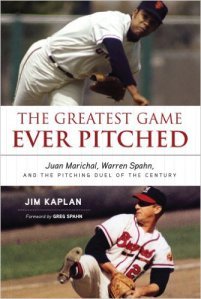
Warren Spahn threw, on his 276th pitch, a screwball that did not break and a pretty good hitter by the name of Willy Mays knocked the ball out of the park for a walk-off home run for the 87 people left in the stands…276 pitches. Oh, did I tell you, Warren Spahn was 42 years old at the time.Some people here were at the game yesterday. I guarantee you the game got less interesting after inning five. What’s the problem? We’re not in it for the long haul. The going gets a little tough…just pull him out. He has pitched too much. Let me tell you something. That’s not the how it should be for people of God. I use that for a metaphor, bring it into church. “Oh you know, we’re working too hard. I go to church once a week. Small group? That’s a lot.”
Man, when I was growing up we went to church every hour on the hour. We never had a break. You talk about cults. People in those churches join cults just to get more spare time! That’s the way it was. Sunday morning, Sunday night, Wednesday night, we had revival meetings and visitation night and you had all this stuff. Every once in a while, you said, “Stay home with your family,” and you had to go figure out who your family was. I mean that’s how much you went to church.
But now, I’m going to have a seven-part series. “Well, I can make four of them, preacher, but I got stuff to do and so forth.” Well, here’s the thing maybe there needs to be more spiritual citizenship in the kingdom of God and maybe you’re all about the poetry, “Rev us up!”—but not about so much about the prose.
Two-hundred-thirty-four years old… Give me just a couple of more moments here. I want to tell you a story…1775, September, just a few months after Lexington and Concord and what Emerson said was the shot heard round the world. A group of soldiers visited a little church 30 miles northeast of Boston in a town called Newburyport. Now you’ve heard of the Old North Church and Paul Revere? Well this is the Old South Church, not a famous church. It’s forgotten, but I think it’s important.
They went there to listen to a chaplain. They were getting ready to go into battle. They were getting ready to go and fight, and they were led by a very interesting character. The leader of the regiment was a guy by the name of Benedict Arnold, but they were going to battle. They thought, “We ought to pray and go to church. The chaplain is speaking.”
Some of them, though, wanted to go to this church not because they wanted to hear this chaplain, but because they knew something special was there. A lot of people pointed out the bell in the clock tower of the church had been crafted be a silversmith by the name of Paul Revere who had been famous recently. And on the Sunday after Lexington and Concord, the preacher of that church got so energized about liberty, that during the middle of his message, people were so inspired a man got up and stood in the aisle and volunteered on the spot for the new Continental Army.
By the time the service was over, 60 others had joined. It’s probably the first regiment to be formed after Lexington and Concord. So the church had a little storied history, but that’s not why some wanted to be there. They were interested in something under the pulpit because under the pulpit there was a crypt, a coffin, a grave.
It’s still there.
It had to do with the history of this church because this church had been founded around 1740, and one of the men who had founded the church was a famous evangelist who, in 1770, as an older man, came back to preach and on the Sunday morning he was supposed to preach, he died. They buried him in the basement in a crypt under the pulpit. His name was George Whitefield the great evangelist of the Great Awakening.
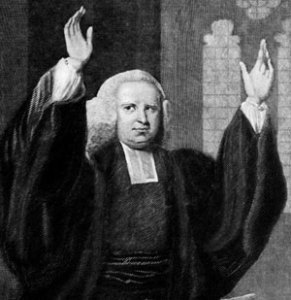
As these men of the Continental Army sat there and they watched this, they couldn’t wait for the chaplain to be done. After it was over, they asked the sexton of the church, “Could you show us the tomb?” They went down, and he actually opened it and they took some scissors and excised a couple of pieces of fabric. I know it’s sort of ghoulish, and I wouldn’t do it, and they took those as good-luck charms into battle with them.
I don’t believe in amulets, good-luck charms, but I think I understand what they were trying to do. They wanted to connect with this man.
I think they knew, you see, that what they were doing that day and whatever was going to happen on these shores had a lot to do with what that man did. You’ll hear a lot today about the 234th birthday of the United States, July 4, 2010, but if birth follows after a period of time, conception and gestation, where do you place the conception and the gestation of the nation?
Well, I believe it was in 1740, 1741, 1742 in something called the Great Awakening…a spiritual revival that led to thousands of conversions and hundreds, and hundreds, and hundreds of new churches being formed on these shores. These men going to battle still heard the stories and remembered that the DNA of faith was part of what they were fighting about and for. I love this country, but I don’t think this country remembers.
A few years ago, a member of my church in New York went to that church and brought back some pictures. It’s probably been cleaned up since, but he said, “I want to see the tomb.” They let him in. And down in the basement, Whitefield’s tomb, there is a little bust and there were paint cans and ladders and drop cloths and everything. In other words, nobody visited. It was just, you know—a mess.
We just forget.
We had an awakening spiritually in this country that fueled a future revolution! I have to tell you, on July 4, 2010, I can’t think of anything more important than for America to have another spiritual awakening of people of God, not a particular denomination. Whitefield used to preach, “Father Abraham, do you have any Baptists up there? No. Do you have any Presbyterians up there? No. Do you have any Lutherans up there? No. Do you have…? We just have people who know Jesus.”
Maybe we won’t all be in the same church, or in the same political party, but something has to happen. Something has to happen. Maybe it will happen if a few of us determine today to be pilgrim patriots. – DRS


April 4, 2016
Remembering Dr. King, the Preacher, Nearly 50 years Later
Dr. Martin Luther King Jr. was a great man on so many levels. But he was first a pastor/preacher, erudite and eloquent, persuasive and passionate. He could also be controversial in the pulpit.
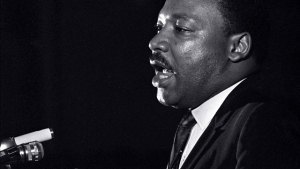 Dr. King was killed 48 years ago today in Memphis, Tennessee. I wonder what he would think about our national journey since the day his powerful voice was so violently silenced?
Dr. King was killed 48 years ago today in Memphis, Tennessee. I wonder what he would think about our national journey since the day his powerful voice was so violently silenced?
A year to the day before his death in Memphis, Dr. King preached Riverside Church in Manhattan. The church, built against the backdrop of the Fundamentalist-Modernist controversy of the 1920s, was founded by Harry Emerson Fosdick and John D. Rockefeller Jr., a liberal preacher with a generous benefactor. Mr. Rockefeller initially donated more than $10.5 million, and his contribution grew to more than $32 million by 1959. It was a case of petro-dollars funding Protestant liberalism.
As Dr. King spoke to a crowd of nearly 4,000 on April 4, 1967, he said that as a religious leader he wanted to “move beyond the prophesying of smooth patriotism to the high ground of a firm dissent.”
His subject was not Civil Rights – it was the Vietnam War.
Though careful to talk about America as his “beloved nation,” and not hesitant to address the crowd as “my fellow Americans,” he said that “the greatest purveyor of violence in the world” was “my own government.”
At that time, polls indicated that nearly 75% of Americans supported the war.
Dr. King faced his own media firestorm in the immediate aftermath of his “Beyond Vietnam” speech. The Washington Post described it as “unsupported fantasy,” and the New York Times called it “Dr. King’s Error.” U.S. News and World Report went even further, suggesting that King was “lining up with Hanoi,” and President Johnson angrily speculated that King had “thrown in with the Commies.”
Even legendary baseball player/hero Jackie Robinson came out against the speech and the NAACP adopted a resolution warning that King’s effort to connect the anti-war movement with civil rights was a “serious tactical mistake.”
Later that year, the annual Gallup Poll of the “Ten Most Popular Americans,” would not include the name of Dr. Martin Luther King Jr.—for the first time in more than a decade.
One long and very difficult year after his Riverside remarks, Dr. King was in Memphis. The night before his death, he was scheduled to speak at Mason Temple. There were storm and tornado warnings, and he was weary from travel, so he asked Rev. Ralph Abernathy to go in his place. When Abernathy got to the church, he saw thousands who had braved violent weather to hear King, so he called back to the Lorraine Motel and encouraged his friend to come over. King did go over, and he gave what was to be his last sermon.
During his 20-minute extemporaneous address that evening, he asked: “Who is it that is supposed to articulate the longings and aspirations of the people more than the preacher?” He then added a word of encouragement to the great number of preachers in the crowd: “I want to commend the preachers…and I want you to thank them, because so often, preachers aren’t concerned about anything but themselves. And I’m always happy to see a relevant ministry.” As he warmed to the crowd and his message he said: “We don’t have to argue with anybody. We don’t have to curse and go around acting bad with our words.”
He called for the development of what he referred to as “a kind of dangerous unselfishness” and segued to a rhetorical comfort zone, the biblical story of the Good Samaritan. He used the famous story as the basis for his admonition: “Let us rise up tonight with a greater readiness. Let us stand with greater determination…we have an opportunity to make America a better nation.”
Then he waxed personal, describing a previous assassination attempt by “a demented black woman” ten years before and how the blade came so close to his aorta that one sneeze would have ended his life. This was a familiar King story, one that he told many times with the refrain “If I had sneezed…” being repeated again and again for effect. At this point, other preachers on the platform that night became unsettled because this story was usually one placed earlier in a speech. The concern was that Dr. King might “miss his landing” and not end on a high note.
There is an old formula in the African-American tradition of preaching: “Start low, go slow. Rise higher, catch fire. Retire.” The concern was that King was not quite catching fire. Then, however, came those final moments as he talked about being to the mountain top and seeing the “promised land,” and the now famous and passionate ending: “So, I’m happy tonight! I’m not worried about anything! I’m not fearing any man! Mine eyes have seen the glory of the coming of the Lord!”
As a preacher, King was Sunday-centric, always with an eye on the next sermon. So the next afternoon, Thursday, April 4, 1968, he placed a call from room 306 of the Lorraine Motel back to Ebenezer Baptist Church in Atlanta and gave his secretary the title for his upcoming Palm Sunday sermon: “Why America May Go to Hell.”
He never had the chance to preach that one. A few hours later his voice was silenced in a brief and deadly explosion of violence.
Dr. King is remembered all these years later for his words and deeds. He is honored–appropriately so—as a hero. It is, though, an interesting question: “What would Dr. King say today—and how would he be received?”
[Elements of this article have been excerpted from the author’s book, ‘IN THE ARENA: Reflections on Culture, History, Politics, and Faith’]


November 17, 2015
BASED ON A TRUE STORY
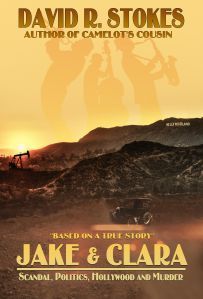
My latest book, “JAKE & CLARA: Scandal, Hollywood, Politics, and Murder,” is now available in early release—e-book only (at significant discount off the permanent release price). The book will be fully released in print and e-book formats and available via 39,000 retail outlet and libraries December 1st.
“Jake & Clara” is based on a true story. All the characters are real. But because I have invented dialogue, a book like this often falls into the category of historical fiction. But I think it is a better fit for narrative nonfiction or true crime.
When Warren Harding won the White House in 1920, his campaign received millions from Jake Hamon—“The Oil King of Oklahoma.” Harding planned to make Jake the most powerful businessman in America. But Mrs. Harding (some called her “The Duchess”) had one condition—the married man had to end his affair with his long-time mistress, a girl named Clara. Jake and Clara had been together for ten years, since she was seventeen and he was thirty-seven. But Jake coveted the powerful Washington job, and he dumped Clara a couple of weeks after Harding was elected.
A few days later, Clara shot Jake.
By the time Jake died, Clara was in the wind. A headline-grabbing national search was conducted for the beautiful fugitive. Clara “sightings” were reported far and wide. A pair of colorful lawmen found Clara in an unlikely hiding place and brought her back to Ardmore, Oklahoma to face the charge of first-degree murder. What followed was one of the most sensational murder trials of the era. A “dream team” of powerful lawyers surrounded Clara in the courtroom. Soon Hollywood came calling, wanting to put Clara’s story on the big screen—starring Clara as herself.
And all of this actually happened.
Historical fiction has been defined as “a hybrid form, half-way between fiction and nonfiction. It is pioneer country, without fixed laws.” I would say that “Jake & Clara” is much closer to narrative nonfiction. And after all, even those who craft nonfiction stories must rely on their sources—sources that themselves are often anecdotal and flawed. I think a writer needs to get the facts right. But the hook is in the color.
Why write historical fiction? Why not just stick with history itself and write a nonfiction account of something? I mean, David McCullough’s books aren’t so bad, and some say they read like novels. But here’s the thing—what about great stories, real ones, from history, where there is not enough material in the records to fill in all the blanks?
This is, I think, the greatest service the historical fiction writer can provide for readers. Sometimes the only “story” we have exists in fragments. The DNA of a broader narrative is there, but it’s not easily seen, and it must be carefully reconstructed with informed imagination.
Enter the practitioner of the craft of historical fiction. The writer builds a superstructure from a few fragile fragments, but always with an eye on all other relevant facts and materials extant. It’s sort of like how they build dinosaur skeletons from a small assortment of scattered bones.
The late Irving Stone was a genius at this. Writing in the preface to one of his great books, “The President’s Lady: A Novel About Rachel and Andrew Jackson,” he talked about this kind of research and writing. He said it was, “as authentic and documented as several years of intensive research, the generous assistance of the historians and librarians in the field, and literally thousands of books, magazines, pamphlets, newspapers, diaries, public records, correspondence and collections of unpublished memoirs and doctoral theses can make it.”
Then Stone dropped the other shoe: “The interpretations of character are of course my own; this is not only the novelist’s prerogative, but his obligation. Much of the dialogue had to be recreated, but every effort has been made to create it on the basis of individual character, personality, temperament, education, idiosyncrasy, as well as recorded conversations and dialogue, memoirs, diaries, letters, and published accounts by relatives, friends, associates, even of detractors, and enemies.”
To my mind Stone struck the right balance, setting a standard for all who dare to reimagine the past. — DRS
[Get your early release e-book copy of JAKE & CLARA for just $2.99. The price goes up significantly and permanently on December 1, when the book is widely releases and available. CLICK HERE.]


October 31, 2015
Orson Welles, Aliens, and Us ;)
[As America began the day on Halloween back in 1938, the news of the day is what had happened–or hadn’t really happened–the night before. That was the night of the famous ‘WAR OF THE WORLDS’ hoax broadcast by Orson Welles. Below I’ve posted a chapter from my book, ‘HOW TO KEEP CALM & CARRY ON,’ which begins with the story of that night 77 years ago. — DRS]
—–
By the late 1930s, radio was a living room fixture in the majority of American homes. Furniture was arranged around the device, like big screen televisions today (which my wife still won’t let me have—sigh…). People back then were increasingly entertained, amused, and informed via the talking box. It was a great time for the imagination. Images were created in the brain, not on a screen.
Though radio news had been part of broadcast schedules for many years, the events in Europe leading up to World War II did for that medium, what the first Gulf War did for cable television news in the early 1990s. The marriage of medium to moment brought radio to critical mass.
In September 1938, the famous broadcaster of the day, H.V. Kaltenborn, made 102 broadcasts in eighteen days as the rumors of war in Europe reached fever pitch. That was during the Munich Crisis as British and French leaders persisted in denial and pathetically continued to try appeasement with Hitler.
More radio sets were sold during those eighteen days than any other similar period in history. People sensed war was coming and they wanted to be able to know the latest. Radio news became a major part of the line-up as the time allotted for news swelled to more than ten percent of total airtime.
As the world grew more dangerous, it was also getting smaller.
Of course, people also wanted and enjoyed the entertainment. There was no doubt about that. It provided a measure of escape from the challenges of domestic life in a time of economic depression (there was actually a 2nd Great Depression in 1938) and from a larger world that seemed determined to destroy itself.
There was comedy with Jack Benny, suspense with The Green Hornet, and even more suspense with The Shadow. Big companies would purchase blocks of time for advertisement. So some shows bore corporate names—sort of like a lot of sports stadiums today. For example, The Texaco Star Theater, debuting October 5, 1938, featured comedy and variety.
But the favorite entertainer that year—especially for boys like my dad and his older brother—was the ventriloquist Edgar Bergen and his dummy, Charlie McCarthy. Never mind that even I could do ventriloquism on radio. the Stokes brothers never missed a Sunday night broadcast of The Chase and Sandborn Hour.
One Sunday that autumn, the Stokes brothers stayed a couple of nights at their Uncle Joe’s house in Detroit. The next night was Halloween and his neighborhood was a great place to fill their pillowcases with candy. So Jerry (my dad) and his brother Jim took their places on the rug near the big console radio in Uncle Joe’s living room at 8:00 p.m. and set the dial to WXYZ, which carried the NBC Blue Network.
They laughed at the opening bit, a typically hilarious Edgar Bergen-Charlie McCarthy routine. Then their laughter turned to near instant boredom as some dumb lady came on and did a drama thing. Never mind that the lady was Madeleine Carroll, a famous British actress—the highest paid that year in Hollywood, earning more than $250,000. She became a big star via her recent performance in a popular Alfred Hitchcock film called The 39 Steps.
None of that impressed Jerry and Jimmy; they wanted to hear the funny stuff.
So they turned the dial back and forth and soon found some pretty cool music on WWJ, which carried CBS shows. Mercury Theater was scheduled to be on the air at that moment. So they left the dial there and tapped their toes to a band playing a Spanish-sounding song, fully planning to check back at WXYZ a few minutes later for more Charlie McCarthy fun. Possibly this is exactly the moment channel surfing was discovered.
But the boys never made it back to the NBC Blue Network that night. In fact, all across America in thousands upon thousands of homes, little boys and girls and all grown up adults glued their ears to what was being piped into their living rooms. It began like this:
“Ladies and gentlemen, we interrupt our program of dance music to bring you a special bulletin from the Intercontinental Radio News. At twenty minutes before eight, Central Time, Professor Farrell of the Mount Jennings Observatory, Chicago, Illinois, reports observing several explosions of incandescent gas, occurring at regular intervals on the planet Mars. The spectroscope indicates the gas to be hydrogen and moving towards the Earth with enormous velocity…”
Then all of sudden, it was back to the Spanish music as Jerry and Jimmy stared at each other. They called out, “Hey Uncle Joe, come here, something just happened on the radio.”
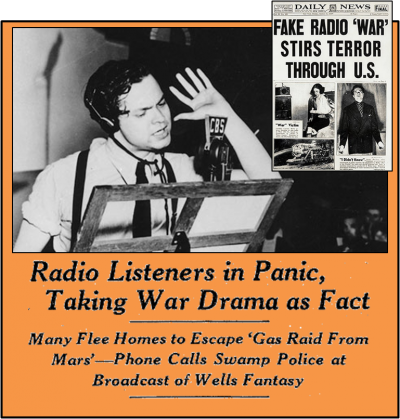 Similar scenes played out all across the country that night. The music was interrupted again and again with more details about a spaceship crashing in a place called Grovers Mill, New Jersey. Something snake-like crawled out. Fields caught fire. All reported on the radio.
Similar scenes played out all across the country that night. The music was interrupted again and again with more details about a spaceship crashing in a place called Grovers Mill, New Jersey. Something snake-like crawled out. Fields caught fire. All reported on the radio.
Forget that Hitler guy who wanted to take over some far away place called Czechoslovakia—these were Martians—and they wanted New Jersey!
Of course, it was all a hoax first dreamed up by a young radio actor named John Houseman (he grew up to become Professor Kingsfield in The Paper Chase) and brought to life by his boss, 23-year-old Orson Welles. It had been advertised right in newspapers earlier that day in the section where it showed the radio lineup for that night. There in plain sight it said: “Play ‘War of the Worlds,’ Mercury Theater. CBS Radio.” And the broadcast began with a disclaimer—which didn’t help all the people tuning in late.
The radio spoof became a textbook case of mass hysteria. In an instant, millions of people believed we were under attack by aliens.
Of course, H. G. Wells and Orson Welles were ahead of their times with their interest in aliens. These days you can find countless books and movies about the idea of odd-looking life forms coming from somewhere “out there” to do us harm. Just do a Google search on “Area 51” and you’ll find thousands of pages of theories about the subject.
Oh, and by the way, you’ll also be placed on an interplanetary watch list—just sayin’.
Yet according to the Scriptures, aliens have been on the earth for thousands of years.
Really.
The first real life alien was a fellow named Abraham. And he passed on his alien DNA to his son, and now there are millions of people with the “not from this world” gene in them. It’s called “incorruptible seed” in one place. And when you have this gene you are born again.
Cue the church organ.
The writer of the Book of Hebrews said this about Abraham and his heirs:
“All these people were still living by faith when they died. They did not receive the things promised; they only saw them and welcomed them from a distance, admitting that they were aliens and strangers on earth.” — Hebrews 11:13
The words “aliens” and “strangers” are from similar Greek words meaning “belonging to another”—in other words, from somewhere else. Having done my share of world travel, I have managed to provoke the question loosely translated: “You’re not from around here are you?” This has also been expressed to me on occasion without the use of words—just a condescending stare.
Have you ever known someone who was really “different?”
Have you ever said of someone, “That guy must be from another planet?”
Better yet, has anyone ever noted such a difference in you because of your faith, that it just seems to them to be—strange?
Distraction and Detachment
The Bible reminds us in several places that one of the secrets to being able to Keep Calm and Carry On is to see ourselves as temporary residents of this world—just passing through. We’re here, but because Christ has redeemed us and lives in our hearts, we’re not from here.
“But our citizenship is in heaven…” — Philippians 3:20
“Peter, an apostle of Jesus Christ, To God’s elect, STRANGERS IN THE WORLD (Emphasis added) scattered throughout the provinces of Pontus, Galatia, Cappadocia, Asia and Bithynia,” — I Peter 1:1
“Since you call on a Father who judges each person’s work impartially, live out your time as STRANGERS here in reverent fear.” — I Peter 1:17
“Dear friends, I urge you, as ALIENS and STRANGERS, to abstain from sinful desires, which wage war against your soul.” — I Peter 2:11
There are two basic parts of this concept of being here, but not from here—being in the world, but not of the world, so to speak. First, we must understand the difference between godly and ungodly distraction.
In order to understand the concept of being an alien or stranger in this world, we have to understand our basic post-conversion relationship with the world. The Apostle Paul laid this out for us in his letter to the Galatians:
“May I never boast except in the cross of our Lord Jesus Christ, through which the world has been crucified to me, and I to the world.” — Galatians 6:14
If you are saved, the world is crucified—in effect, dead—to you, and you are crucified to the world. There’s a divide. Something’s happened. It’s different. There’s a distinction. There’s a separation. In fact, separation is the essence of what the Bible means when it talks about death.
The cross of Christ has made the ultimate difference.
In practical terms, this means that we need to guard against being distracted by the world. What does the Bible mean when it talks about the world in this context? It means the basic principles that govern the world system. It can all be boiled down to one word—Lust.
Of course, most of us think immediately of sexual sin when the word lust appears—and there’s no doubt that such immorality is indeed driven by what the Bible calls lust. But the term is much broader than mere sex. Lust is an attitude and approach to any area of life that excludes God and idolizes aspects of this present world. It’s desire aggravated by heart rebellion. It’s desire that is “over the top.” It’s desire that has reached the point of obsession. It’s intense craving—particularly for something forbidden. This is why we are told not to love the world and its intrinsic lust:
“Do not love the world or the things in the world. If anyone loves the world, the love of the Father is not in him. For all that is in the world—the lust of the flesh, the lust of the eyes, and the pride of life—is not of the Father but is of the world. And the world is passing away, and the lust of it; but he who does the will of God abides forever.”
— I John 2:15-17 (NKJV)
But as we discussed in the earlier chapter about holiness, this is where so many sincere followers of Jesus Christ make a serious mistake. They are sincere about not being “worldly” and very much want to live above the various manifestations of human lust, so they default to a knee-jerk approach—rules, rules, and more rules. It’s easy to do because it sounds so simple. But does it really ever work?
No. Legalism short-circuits the spiritual power and joy of far too many Christians.
The truth is that the proliferation of rules to control behavior—even the most sincere efforts to legislate morality—is not really spiritual. In fact, it is the epitome of worldliness. That’s right, a legalistic and rule-driven approach to trying to be spiritual is—worldly. Paul talked about this in his letter to the believers at Colosse. They were enamored of the ascetic discipline of some false teachers and saw them as great spiritual examples. These teachers talked a lot about “defeating the flesh,” but their hyper-regulation methods were suspect:
“Therefore, if you died with Christ from the basic principles of the world, why, as though living in the world, do you subject yourselves to regulations—“Do not touch, do not taste, do not handle,” which all concern things which perish with the using—according to the commandments and doctrines of men? These things indeed have an appearance of wisdom in self-imposed religion, false humility, and neglect of the body, but are of no value against the indulgence of the flesh.” – Colossians 2:20-23 (NKJV)
Such legalists abound today in and around the Body of Christ. They are neo-Pharisees, “teaching for doctrines the commandments of men.” They are like the usual suspects who harassed Jesus at every turn. And they frustrate current day followers of Christ with their rules. They have many more “standards” than the Bible has, often elevating personal preference to the level of absolute dogma. It’s quite toxic.
And it’s actually very worldly. Ironic, huh?
So if rules don’t work, how do we avoid being obsessively distracted by the world? It has a powerful gravitational pull that relentlessly tries to drag us down to its level, when we know that God intends for us to live above it all. We’re called to be overcomers.
The key is to counteract ungodly distraction with godly distraction. Now distraction can be a bad thing or a good thing. What do I mean by this? Did you ever hear somebody say, “Well, she is so heavenly-minded she is no earthly good”? They usually mean someone who is self-righteous or pious or impractical or whatever. But in a real sense, if you are a vibrant Christian with your mind fixed on God, you’ll be a much more centered person. Isaiah 26:3 (KJV) says, “Thou wilt keep him in perfect peace, whose mind is stayed on thee…”
Godly distraction is when you’re distracted by something else—something infinitely more fascinating than anything this world offers. Focus on God. Want perfect peace? Think about the Lord and His goodness and His grace. That means you’re going to be thinking of heaven, thinking of a better place, and like the patriarchs of old, seeing them in the distance—your compelling future in Christ.
In other words, to the extent that you’re distracted by the big picture of what God is doing and wants to do, you won’t be distracted by the negative, drag-you-down, kick-you-around, stomp-on-you stuff of this world.
The second vital concept is detachment. You can live a defeated life driven by ungodly detachment. This happens when you’re so enthralled with the world and all its false promises that you disconnect from things associated with the Kingdom of God.
Economics. Entertainment. Culture. Power. People get really hung up on all these things. That becomes their lives. They live vicariously through their favorite character on television, or through some political leader, or through some other situation. They become detached from anything God wants to do.
God wants you, instead, to have a different kind of detachment—a godly detachment. He doesn’t want you to leave this world. He wants you to function in it. He doesn’t want you to be like an Amish person hiding out until Jesus comes. He wants you to live and work and be part of it, but to live in this world with a sense of detachment. It’s when we become indifferent to the world and its lusts.
What does this detachment, this indifference, come from? It comes because our hearts are in another place. To the Christian, home is heaven with God. That’s where our hearts should be. But we are still here and have work to do.
Reject Self-Destructive Attitudes and Behaviors
First Peter 2:11 in the King James Version says it like this: “Dearly beloved, I beseech you as strangers and pilgrims, abstain from fleshly lusts, which war against the soul…”
Think of the soul as your personality, your mind, your emotions, and your will—the essence of you. We are to abstain from “fleshly lusts,” any strong desire in our lives that drags us down and short-circuits our spiritual strength. And remember, lust is any improper or inordinate or strong desire for anything outside of the will of God.
Self-destructive behaviors can involve physical sins. Christians struggle with physical sins. Peter says abstain. Just say no. I understand that this is easier said than done, but the first step is to just say no. This is accomplished when we remember—right there in the moment of distraction and temptation—that because of the cross, the world has been crucified unto you, and you unto the world. You actually can say no.
You may feel at times as if you are a slave to your habits, but you’re not. You’re to live in freedom. You’re not controlled by sin. You can overcome it. But you have to be decisive. This is why Jesus said, “If your right hand offends you, cut it off. If your right eye offends you, pluck it out.” Now if you read in Matthew’s Gospel where that comes from, Jesus is talking about divorce and adultery.
So let’s apply it to sexual immorality. I’ve had people come to me for counseling and say, “I’ve been involved in an affair. It’s not right, and I want to get my life right with God, and I want to break it off.” I will say, “Then do that, because that’s what you need to do.” This usually elicits a reply like, “Well, I feel like I need to meet with this person one more time for closure.” I counter, “No. It needs to be cold turkey.”
Are such decisions painful? Sure. Cutting your hand off is painful. Gouging your eye out is painful. But when it comes to dealing with clear sin in our lives, the best thing is severe action and drastic action. Don’t wait for the “opportune” moment. Your capacity for rationalization will see to it that such a moment never comes. And don’t pray, “O God, deliver me. Get me out of this!” God’s Word reminds us again and again that we must take the first step—then the promised power of God kicks in.
Practice Deliberate Goodness for God’s Glory
Peter wrote:
“Live such good lives among the pagans that, though they accuse you of doing wrong, they may see your good deeds and glorify God on the day he visits us.” — I Peter 2:12
Jesus said:
“Let your light so shine before men, that they may see your good works, and glorify your Father which is in heaven.” — Matthew 5:16 (KJV)
What is your light? Your good works. Let’s dissect that. First of all, God is light. We have no intrinsic light. When we get saved, the light of God (II Corinthians 4) shines in our hearts. So we have light that comes from God but lives in us. How does this light shine through us to others?
Good works.
When you do good things for others, not for personal credit or affirmation, not to be seen by people and applauded, not to get your name in a church bulletin—or the wing of a hospital—you glorify God. It’s so people can be blessed by your actions and sense that the good things you do are because God is at work in your life.
That’s a powerful way to witness!
Relate to Secular Reality in a Spiritual Way
Note what Peter says in I Peter 1:13-17:
“Submit yourselves for the Lord’s sake to every authority instituted among men: whether to the king, as the supreme authority, or to governors, who are sent by him to punish those who do wrong and to commend those who do right. For it is God’s will that by doing good you should silence the ignorant talk of foolish men. Live as free men, but do not use your freedom as a cover-up for evil; live as servants of God. Show proper respect to everyone: love the brotherhood of believers, fear God, honor the king.”
This is a passage that basically says be a good citizen. Don’t be a lawbreaker. But is there ever a place for civil disobedience?
Peter’s words parallel Romans 13, where Paul writes, “Obey the powers that be, the governmental leaders, because they are put there by God.” When Paul wrote that, and when Peter wrote this, they were under the Roman system, and do you know who was running the show? Nero—remember him?
It presents civil leaders as the sovereign, the king, or the emperor. In a republic, political leaders are not sovereign. I think leaders in office deserve our respect and our support, but the sovereign in America is the people. “We the people…” The United States of America is a constitutional republic (not a pure democracy, by the way).
So as we examine these principles, we need to bear in mind the political distinctions between then and now. Back then, people couldn’t go to Nero, “You know what I think, Nero, we ought to change this law. This is the polling I’m getting.” Roman citizens had certain rights, but they had no say.
We have both—just sayin’.
I think the thing we should take away from this is that followers of Christ should have great respect for authority. We’re not scofflaws. And when it comes to the practice of civil disobedience, we ought to think it through very carefully and seriously.
In 1954, there was a senator from Texas by the name of Lyndon Johnson, who later went on to other things. As the Majority Leader, he helped navigate a law through the Senate that went through the House. It was signed into law by President Eisenhower. The statute amended the IRS code for 501(c)(3) corporations (churches, non-profits). It says, “…no substantial part of the activities of which is carrying on propaganda, or otherwise attempting to influence legislation…and which does not participate in, or intervene in (including the publishing or distributing of statements), any political campaign on behalf of (or in opposition to) any candidate for public office. Nor shall the church engage in subversive or un-American activities.”
I think it’s a bad law, not because I want to get up in the pulpit and preach politics and tell the church how to vote. I’m never going to do that. I’m going to teach biblical principles, but your vote is between you, your conscience, your God, your family, and however else you feel about this. But the law, to me, inhibits pulpit freedom. Can you imagine telling Martin Luther King, Jr. that he couldn’t preach about politics when he was talking about Rosa Parks from the pulpit of Dexter Avenue Baptist Church in 1955?
I also think it’s an unenforceable law. When it has been enforced, it’s been done selectively, because at one end of the spectrum, there is a lot of latitude given to churches about political campaigning for particular individuals. At the other end of the spectrum, there is a lot more critique of it. I don’t think that’s fair, whether you’re a liberal or conservative.
Lyndon Johnson was getting ready to run for reelection in Texas when the law was drafted—and he had presidential ambitions. But in Texas, a lot of preachers were against him and they were talking about it in their pulpits all over the state. This had been going on there for many years. The practice of politicizing the pulpit started with the preacher I write about in The Shooting Salvationist (he was dead by the time LBJ pushed the law). J. Frank Norris of Fort Worth turned pulpits (for good or ill) into powerful political mediums. So Johnson wanted to tie the hands of preachers who would oppose him in the next election.
Now, I don’t think a preacher should ever get up and say, “Vote for A,” or “Vote for B.” I don’t, but I don’t have any problem if that local church thinks that preacher should, and that preacher thinks he should, and let the chips fall where they may. I don’t think there should be a law against it. I think it’s a matter of free speech. That’s their business to do, and I think the law is interpreted and applied unfairly, and I think it is a bad law. I think it should be rescinded.
But I will obey the law until it is rolled back. I will also work to see it overturned.
However, is there ever a law so bad that we become duty-bound to not only try to change it, but to disobey it as an act of conscience?
Certainly.
If they pass a law that says we can’t preach Jesus, I’m going to preach Jesus. If they pass a law that says we can’t preach the Bible, I’m going to preach the Bible.
And think about slavery. We fought a war over that. Part of the prelude to the war was the forming of opinion. Do you know the name Harriet Beecher Stowe? She wrote the book “Uncle Tom’s Cabin.” Harriet Beecher Stowe was a preacher’s kid. Her father was a very famous preacher in the Second Great Awakening, a man by the name of Lyman Beecher (Litchfield, Connecticut, and then Lane Seminary).
Harriet Beecher Stowe had a brother named Henry Ward Beecher. You may know the name now Harriet Beecher Stowe, but in those days, the name Henry Ward Beecher was much better known. He was the pastor of the Plymouth Congregational Church in Brooklyn, New York, and he was the most famous man (not just preacher, but man) in America. He used to preach every Sunday against slavery and against any candidate who promoted slavery by name. He would bring slaves to the church platform and raise money to purchase them so they could grant them their freedom.
This was before the Civil War.
Change eventually happened because preachers like Henry Ward Beecher stood up and said something.
In the 1950s and 1960s, we had a civil rights movement in America. Do you know where it began? It was birthed in local churches. Preachers got up (even after this 1954 law was enacted) in their pulpits and indicated that they supported one candidate over another in particular local, statewide, or national elections.
The church as a force for cultural righteousness is a very important part of American culture.
But our default position is obedience to civil authority. Followers of Christ preach a revolutionary message, but we are never anarchists. We are to be people who, by and large, submit ourselves to God and obey God because we’re aliens.
If you’re understandably concerned about America, the answer to cultural problems is not going to be found in this world—not even the politics of this world. The answer is going to be found in a revived church and Christians being the shining lights they ought to be to share the gospel of Jesus Christ.


October 9, 2015
MAN WHO SAVED PRESIDENT REAGAN’S LIFE HAS PASSED AWAY AT THE AGE OF 85
[I just received word that Jerry Parr passed away today at the age of 85. I wrote this about him a couple of years ago after interviewing his lovely wife Carolyn. My good friend Howard “Ike” Hendershot, retired Secret Service agent, facilitated and participated in that radio interview on WAVA in Washington, DC. Hendershot, who is the Chairman of the Fair Oaks Church board of Trustees, was also on site when President Reagan was shot in 1981. Carolyn and her family are in our prayers. This column was originally published at TOWNHALL.COM — DRS]
Hollywood put out some great movies in 1939, films such as Gone With the Wind, The Wizard of Oz, Mr. Smith Goes to Washington, and The Hunchback of Notre Dame. But one movie that year—now largely forgotten—served a purpose even greater than helping a Depression-ravaged American public forget their dire straits, not to mention the storm clouds gathering around the world. It was called, Code of the Secret Service, and it starred a handsome young actor named Ronald Reagan.
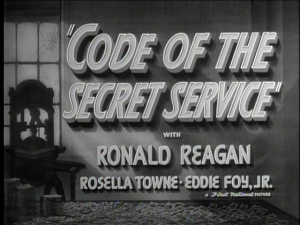 Jerry Parr was nine years old the day his dad took him to a Miami theater to see Reagan play a G-Man named Brass Bancroft. Nearly forty-two years later, Jerry Parr was the Agent in Charge of the detail protecting that once-young actor who became the President of the United States.
Jerry Parr was nine years old the day his dad took him to a Miami theater to see Reagan play a G-Man named Brass Bancroft. Nearly forty-two years later, Jerry Parr was the Agent in Charge of the detail protecting that once-young actor who became the President of the United States.
And on March 30, 1981, Parr’s quick thinking and reflexes became part of history as he pushed President Reagan into a limousine when gunfire erupted outside the Washington Hilton Hotel following a speech to a labor group. There is an iconic photo of the moment capturing the intense grimace on Parr’s face as he forcefully protected his charge.
Jerry Parr, and his wife Carolyn, a retired judge from the U.S. Tax Court, have written a new book, a moving memoir of that fateful day and of Jerry’s life and career. It’s called, In the Secret Service: The True Story of the Man Who Saved President Reagan’s Life.
Parr, who retired from the United States Secret Service in 1985, shares a moment by moment recap of what happened on that sidewalk and in the limousine, including his decision to change course and head to the hospital instead of back to the White House. Mr. Reagan mentioned to Parr, “I think you broke my rib.” And while the agent pondered the prospect of having so wounded the president he noticed Reagan wiping some blood from his lips. “I must have cut the inside of my mouth.” But Parr saw that the blood was “frothy” and instantly realized that as a sign of a lung injury. Next stop GW Hospital. It was a decision that saved Reagan’s life.
Jerry Parr’s career in the USSS began a little more than a year before another president was shot—that one in Dallas, Texas, and with no happy ending. Parr was in Tennessee at the moment of the shooting, but made his way to Dallas a few days later to conduct numerous interviews, including many members of Lee Harvey Oswald’s family.
The book is filled with interesting stories about the Johnson, Nixon, Ford, and Carter years, as well as the Reagan tenure. But there are no salacious tidbits of gossip—the stuff of tell-all books written by purveyors of innuendo and helped along by a few disreputable miscreants who sell their souls and betray vital trusts for selfish reasons. In the Secret Service is a reminder that there are some—many, many—dedicated public servants who do their jobs because they have integrity and a sense of mission above and beyond themselves.
Parr was uniquely positioned to observe the impact of the shooting on Ronald Reagan, particularly his faith that God had spared him for a purpose. Reagan was comfortable talking about spiritual things because they were, indeed, very real to him. In fact, the book is really a story of God’s grace—in Reagan’s life, and the lives of Jerry and Carolyn Parr. It is also a story of finding and doing God’s will.
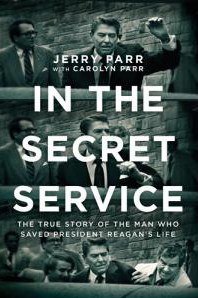 After the events of March 30, 1981 were long in the rear view mirror, and Mr. Reagan had fully recovered, Jerry Parr asked him, “Did you know you were an agent of your own destiny?” He told the president about the visit to that Florida movie house back in 1939, and how he saw the film many, many times thereafter. It inspired a little boy to become an agent like Brass Bancroft. Reagan smiled and in a typical use of humor replied: “It was one of the cheapest films I ever made.”
After the events of March 30, 1981 were long in the rear view mirror, and Mr. Reagan had fully recovered, Jerry Parr asked him, “Did you know you were an agent of your own destiny?” He told the president about the visit to that Florida movie house back in 1939, and how he saw the film many, many times thereafter. It inspired a little boy to become an agent like Brass Bancroft. Reagan smiled and in a typical use of humor replied: “It was one of the cheapest films I ever made.”
It was also—in a very real sense—the most important one he ever made. Nancy Reagan said, “Jerry put himself in harm’s way to protect Ronnie, and I am forever grateful.”
So are we.
[Watch a trailer of CODE OF THE SECRET SERVICE with Ronald Reagan HERE]



